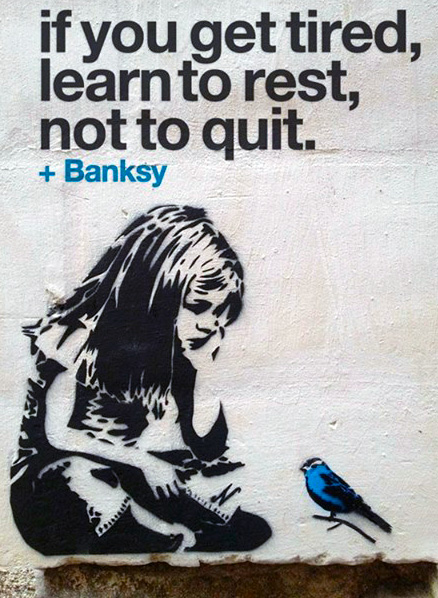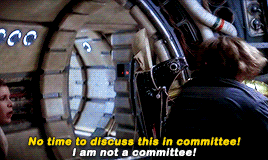This is the fifth attempt at this post. Sometimes, reflecting your way out of dark place professionally takes some iteration. Previous attempts ended up heaping frustration on top of frustration until it seemed overwhelming again – not the best way to resolve a metaphysical crisis even if it is all true. I’m not the smartest, most upwardly mobile educator in the world, but I know my craft and I’m good at getting students to express their talents. I’m also effective under fire and can always find a way to get back on my feet again when the going gets tough. This year has been a test of that resilience and at times it has broken me, but reflecting on a year where Ontario education has lost the plot more than once has me thinking about a Banksy piece:
I’ve been tempted to leave education a few times over the past year for pastures less politically misdirected, but I genuinely enjoy my work, recognize its social importance and don’t want to walk away while my profession has forgotten its primary purpose in a fog of political misdirection and pandemic panic. Education matters. It matters even more in a crisis. That’s a simple truth 2020 has taught me. What else has this epically crappy year taught me?
LESSON 1: The people running ‘the system’ aren’t focused on pedagogy, they’re focused on making it run (at all costs, even if it makes people sick or abuses their lack of privilege)
I’ve known this since I got thrown under the bus for handling my mother’s suicide too slowly, but 2020 has reminded me of systemic intent by shining a harsh light inside the process. From taking multiple pay cuts to protect student learning in January while admin sat in empty schools collecting salary, to watching the system lurch back into the classroom unprepared in September, 2020 has shown that the most important thing to people running Ontario education is making a schedule and then ensuring it happens. Pedagogy and equity might come up in the marketing material, but action around it is non-existent. Threaten the schedule though and you’ll get an immediate reaction.
This came into focus in November when we watched Ontario Education Workers United’s live webcast on how to stop the ‘pedagogically impoverished‘ hybrid/simultaneous online and face to face learning model. I’ve had a go at this unsustainable and problematic smoke screen of an approach on Dusty World previously. There was a great deal of dissonance in listening to educational experts like Doctor Beyhan Farhadi talking about pedagogy when the system itself seems to have turned its back on it entirely.
Our absurd pandemic teaching approach reduces in-class instruction to less than half the normal face to face instructional time while making no changes to curriculum expectations because it’s important to retain the appearance of credibility. Actual pedagogical credibility, let alone equity, compassion and even teacher burnout doesn’t appear to be a consideration unless it’s an email or newsletter – board newsletters have proliferated this year. 2020 has taught me that the system must run at all costs – even at the cost of the people it serves.
Our broken pandemic teaching models also demand that teachers be simultaneously teaching online and face to face to two different groups of students simultaneously all day every day while throwing about a month’s worth of material at students each week. It’s doing this having cancelled face to face special education support which has led to even further inequity in the classroom. It’s an approach that has hurt my son directly. Listening to parents of students with IEPs begging for support and compassion is heart breaking. I’m going to make a point of honouring that need even if the system appears to be deaf to these calls for help.
The paradigm shifting moment during that OEWU webcast was a Toronto teacher and union activist who approached the fight from a very pragmatic angle. She said (and I’m paraphrasing), that the system is only interested in making sure the system works and if you want it to take notice you have to stop if from working. Killing yourself to make a bad system run and then complaining about it isn’t an effective approach. System administration will only pay attention to you if you stop the system from functioning. I’m not sure where to take that truth in 2021, but it’s something to keep in mind if you see systemic abuse occurring and want to stop it.
The Ministry mandated full day of racism training we got in September prior to starting an unprecedented change in schooling feels more like a smokescreen rather than any kind of genuine attempt at addressing inequity. Trot out a day of racism training (entirely delivered by ‘woke’ white women) and then execute a schedule designed to suit privilege while crushing students who don’t have it.
LESSON 2: “This isn’t elearning, it’s emergency remote learning”
A wise colleague said this in one of our earliest online remote meetings and it changed my mind about how to teach in a pandemic. My reaction in a crisis is to display initiative and work to help people, but systemic paralysis was followed by a lurch into elearning with zero support and then a series of baffling changes of direction by the Ministry in terms of what technology we can use.
2020 has taught me that curriculum is less important than student and staff welfare. It’s a pity the people in charge only pitch wellness emails at this ongoing mental health crisis, but as a classroom teacher my ever shrinking sphere of control still allows me to address it with my particular students, and I intend to. While other teachers are crushing students (especially the ones with IEPs) in a desperate quest for academic credibility in a system that’s only pretending to have it, I shall not. This involves differentiating, which is another one of those pedagogical best practices we’ve burned to the ground during this crisis.
Some students, like myself, want to be engaged and kept busy lest they go mad with frustration! For those students I will offer the variation and enrichment I’ve always pursued (yes, even in a pandemic), but for the vast majority less is their new normal. For this group (which includes many teachers), being gentle is more important than being productive. 2020 has taught me that for the majority of people, when the going gets tough, waiting to be told what to doing as little as possible is the way forward. It doesn’t bode well for a future bulging with ever increasing overpopulation in a limited ecosystem, but it’s the world our systemic myopia has brought us to.
2020 has taught me that pushing broken people only breaks them more, so I won’t be doing that even if the system demands it.
This is indeed emergency remote teaching. It isn’t a ‘new normal’ and we shouldn’t all be waving flags proclaiming, ‘I got this’. What we should be doing is looking after the children in our care, supporting their families and our colleagues and making sure that everyone is alright instead of pretending that everything is business as usual. We can always learn what we missed on the other side of this. Meanwhile, we’re getting strident ‘you have to provide blah blah minutes of synchronous instruction online‘ directives as we return to our second bout of emergency remote teaching.
There are too many system-people hanging on too tight that need to unclench. I realize that this is being driven by a sabotaged Ministry, but enforcing it makes you complicit in it. I’m going to look after my little patch (even the ones with special needs!) and push back if my student wellbeing first approach isn’t deemed appropriate by the powers that be.
LESSON 3: Most people just want to be told what to do, even in a crisis…
My first instinct in a crisis is to show initiative and try to act in a way that helps, but the system thinkers don’t want you doing that, they want you to fall in line and do what you’re told. This is problematic for me as my raison d’être in teaching is my agency as a teacher. When the best I can hope from the system is benign neglect I can get a lot done in my immediate space, but when the system is in crisis it insinuates itself into my classroom and this is infuriating. If I wanted to give up my idealism I’d go into management.
from Blogger https://ift.tt/3n3DR2o
via IFTTT







